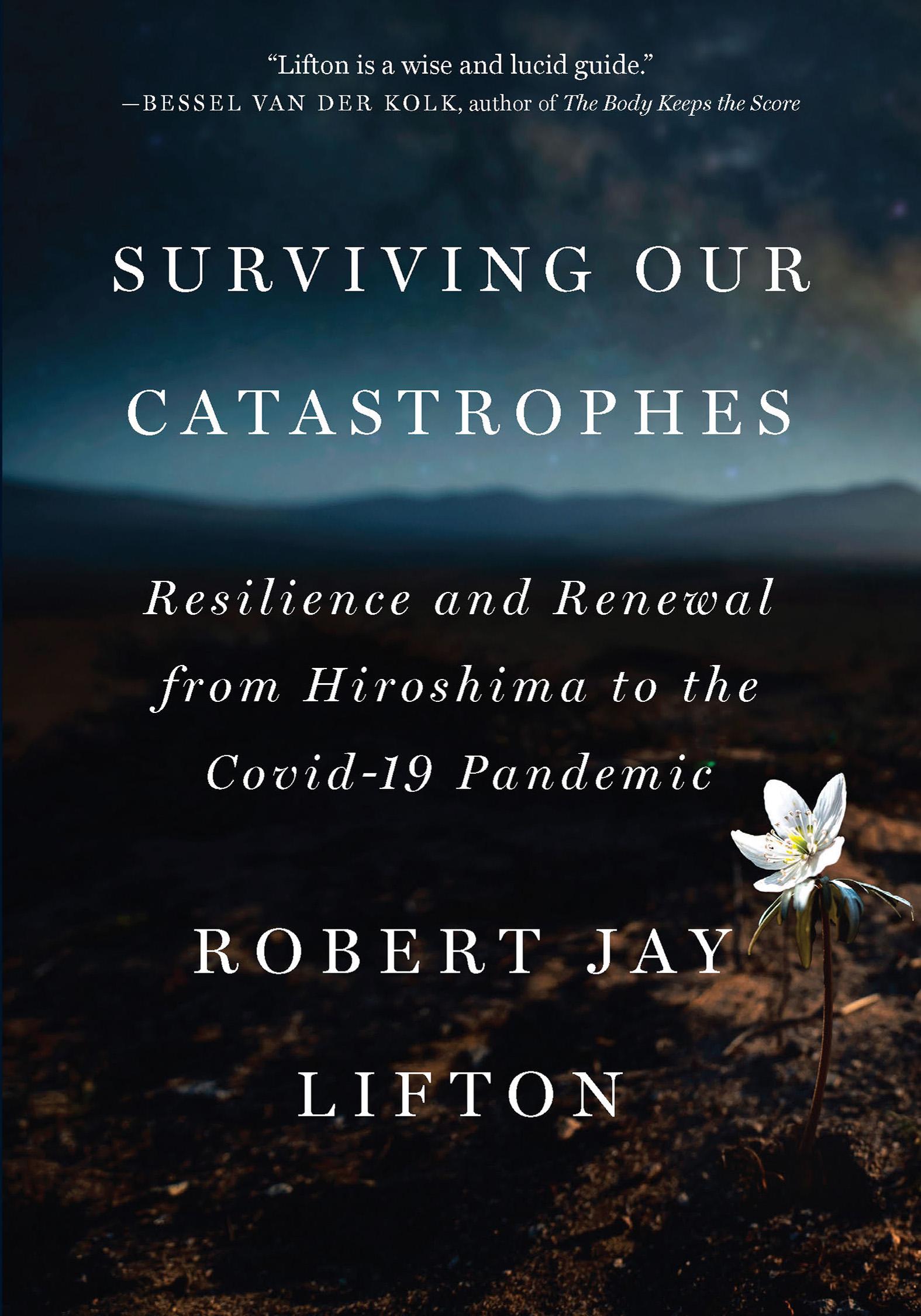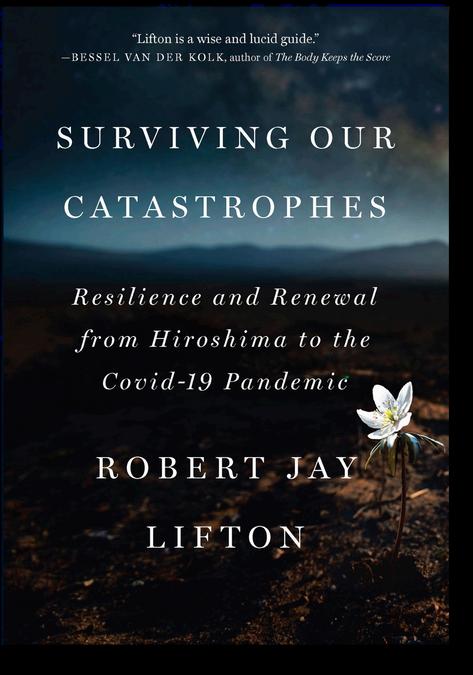ROBERT JAY LIFTON
For
survivors who witness catastrophe and bring us hope.
© 2023 by Robert Jay Lifton
Epilogue © 2025 by Robert Jay Lifton
All rights reserved.
No part of this book may be reproduced, in any form, without written permission from the publisher.
“A Psychiatrist in the World” will appear in slightly different form in the collection Driven to Write: 39 Authors on the Mysteries of Their Art and Craft , edited by Michael Slevin and Ellen Pinksy (forthcoming).
Requests for permission to reproduce selections from this book should be made through our website: https://thenewpress.com /contact.
First published in the United States by The New Press, New York, 2023
Paperback edition published by the New Press, 2025 Distributed by Two Rivers Distribution
ISBN 978-1- 62097-815-3 (hc)
ISBN 978-1-62097-949-5 (pb)
ISBN 978-1- 62097-959-4 (ebook) CIP data is available
The New Press publishes books that promote and enrich public discussion and understanding of the issues vital to our democracy and to a more equitable world. These books are made possible by the enthusiasm of our readers; the support of a committed group of donors, large and small; the collaboration of our many partners in the independent media and the not-for-profit sector; booksellers, who often hand-sell New Press books; librarians; and above all by our authors.
www.thenewpress.com
Book design and composition by Bookbright Media
This book was set in Adobe Garamond and Bodoni 72 Printed in the United States of America
2 4 6 8 10 9 7 5 3 1
Everything is possible in history.
—José Ortega y Gasset
For the real question is whether the “brighter future” is really always so distant. What if, on the contrary, it has been here for a long time already, and only our blindness and weakness has prevented us from seeing it around us and within us, and kept us from developing it?
—Václav Havel
1
Catastrophe and Survivors
Catastrophes are always with us. There is a large historical—one might even say evolutionary—flow, from relatively stable structures, to the social breakdown that comes with catastrophe, to survivors’ efforts at renewal.
Such catastrophes include wars, nuclear attacks, Auschwitz-style killing factories, earthquakes, droughts, uncontrollable fires, widespread flooding, and lethal pandemics. While some of these catastrophes are spoken of as “natural,” all of them have a crucial human contribution, so much so that there is reason to doubt the existence of any purely natural catastrophe. Whatever the catastrophe, survivors can become a crucial force for reconstituting their society.
I am making two assumptions here. First, that a society must recognize the reality of a catastrophe in order to cope with it. And second, that survivors are powerful agents in this process.
What, then, is a survivor? A survivor is someone who has been confronted with death in some bodily or psychic fashion and has himself or herself remained alive. I have come to view survivors as a special group with particular psychological characteristics. But in order to experience
oneself as a survivor, one must overcome the sense of being an incapacitated victim.
The word “victim,” derived from the Latin victima , had the late-fifteenth-century meaning of a living creature being offered as a “sacrifice to a supernatural power.” In subsequent centuries it came to mean a “person who was hurt, tortured, or killed by another,” or “made to suffer . . . from disease or disaster”; and still later, a “person taken advantage of . . . cheated or duped.”
To be a victim, then, is to be helpless, to be acted upon by others for their own purposes, to be harmed, deceived, even destroyed. A victim can feel immobilized psychically as well as physically, preoccupied mainly with his or her misfortune.
The word “survivor,” in contrast, derives from the late Latin supervīv ĕre vīv ĕre meaning “to live” and super suggesting “over” or “beyond.” So the word came to mean “to continue to live on after the death of another,” or “after the end of some condition or occurrence . . . to remain alive, to live on.”
A survivor, then, is an active agent of the continuation of life.
There is always a paradox in connection with the sur-
vivor. The word suggests an encounter with death, and in that way puts death at the center of trauma. But survivor also means remaining alive, whatever the threat or assault.
Survivors of any catastrophe experience a death imprint, a lasting image of people dying in that disaster. That death imprint can quickly bring about a cessation of feeling, a form of psychic numbing, as a way of protecting the mind from an otherwise unmanageable and self-shattering form of death anxiety. In extreme catastrophes, the death imprint can be associated with a breakdown of faith in the function of the larger human matrix.
We humans are meaning-hungry creatures, and survivors are particularly starved for meaning that can help them “explain” their ordeal. Only by finding such meaning can they tell their story and begin to cope with grief and loss.
Survivors are mourners, and their negotiation of the mourning process is crucial both to their renewed energies and to the potential wisdom they may acquire from their death immersion. Survivors may connect the meaning they achieve with a survivor mission, and some of them may devote much of their lives to combatting the catastrophe they had undergone.
That mission can be personal: if my brother dies of
prostate cancer, I may become involved in raising money or otherwise contributing to the treatment of that disease. Or it may be collective: if my city has been destroyed by an atomic bomb, I may join with others in telling the world about that catastrophe and in advocating for the abolition of nuclear weapons.
There are always two possibilities for anyone encountering death: closing down or opening out. When we close down, our pain becomes isolated and unapproachable. When we can open out, we may connect with others and can even become part of a remarkable group who have known grotesque versions of dying and yet returned to the living. In that way survivors can call forth the transformative power of the death encounter. But survivors are never entirely free of the struggle between closing down and opening out.
Leaders in a post- catastrophe environment can sense the importance of survivor agency. For instance, decades after the dropping of the bomb in Hiroshima, one prominent figure there expressed to me his concern about the degree of “victim consciousness” and the need to actively overcome it in order to contribute to the city’s and the world’s renewal. He was suggesting that survi-
vors are engaged in a continuous effort to transcend their victimization.
Both collective and individual mourning can be impaired by the very dimensions of a catastrophe—by the vastness and confusion of killing and dying and the absence of bodies or knowledge of particular deaths, as was the case in Auschwitz and Hiroshima. Even when mourning is impaired in this way, survivors can diminish their grief by collectively bearing witness to what they have experienced and by becoming part of groups that tell the world what they have been through.
That shift from victim consciousness into the ethos of the survivor can be enhanced by “emergent leaders,” usually themselves survivors who unexpectedly appear from outside official structures. These leaders may rally other survivors into significant group efforts that contribute to healing. Members of such groups experience solidarity, find mutual support, and express their pain while beginning to recognize themselves as active survivors.
There are always distinctions among survivors in regard to their death encounter, as we have observed in our Covid pandemic. The pandemic envelops the world and can cause death anxiety in everyone. There are those who personally
experience serious versions of the disease, including long Covid, or have family members or close friends who suffer or die from it. They are the haunted survivors whose experience with the illness immerses them in death. But the rest of us, who have milder cases or do not contract the disease at all, are also survivors—less consumed by death anxiety yet never free of it.
Significant survivor expression in connection with the Covid pandemic has occurred. Groups have taken shape, with names like Survivor Corps, Covid Survivors for Change, Marked by Covid, and Young Widows and Widowers of Covid-19. Such groups can combine knowledge from patients and scientists in their insistence on learning more about the pandemic, knowledge that could serve not only themselves but the larger society.
How does the knowledge that we are all survivors of Covid affect our behavior? It could be a step toward channeling the much broader sense of death anxiety in the direction of potential action. Grief and pain, when shared, can become seeds of activism.



